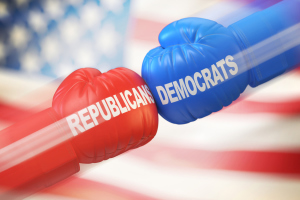The Root of Bitterness Endangers America

"Watch out that no poisonous root of bitterness grows up to trouble you, corrupting people," warns Hebrews 12:15. (NLT)
The current political tone and the debate over "civility" demonstrate that the "root" is growing rapidly in America, and is being nurtured by many important voices who douse the socio-cultural-political landscape with vitriol.
Sadly, what they spew is a reverse weed-killer: rather than eradicating the bad stuff that defiles democracy, the rhetorical bile kills the fruit that would nourish the nation.
I lived and worked in Watergate Washington, in the very bullseye of the hostilities of that age—the Nixon White House. As they say, "you had to have been there" to know just how intensely Nixon was hated.
Nothing we experienced in those days comes close to the bitterness and hatred that characterizes contemporary political maliciousness.
Pennsylvania Avenue in front of the White House was not closed to traffic, nor were the barricades extended into the streets as they are now. Even the most recognizable of Nixon's staff could dine in a restaurant without being surrounded by an angry mob, and could even saunter openly on their way across Lafayette Square.
Now, Senator Rand Paul is concerned that if the present trend intensifies there will be assassinations in Washington. His wife reports that she sleeps with a loaded gun nearby. Already we have seen an attempted mass killing of legislators on a ball field.
How long before someone takes literally Maxine Waters' call to "push back" on members of the Trump team, to have "no sympathy" for them because "they're not welcome anymore, anywhere"?
No wonder the Pauls and others are concerned.
What we are observing is the re-emergence of the bitter-root style that in the nineteenth century was deadly. The fury between federalists and anti-federalists was so harsh in 1804 that the vice president of the United States, Aaron Burr, dueled and killed the creator of the nation's fiscal policy and financial institutions, Alexander Hamilton.
Before we get to that point we need to heed the deep truth of Hebrews 12:14-15. A new car owner gets an operator's manual with his or her vehicle. Ignore its instructions, and there will be a breakdown. The Bible is the "operator's manual" for an orderly civilization.
Hebrews 12:14 says "pursue peace" with everyone. "Peace," in the Greek New Testament, refers to an absence of strife. Healthy democracies must be able to handle competing opinions in a way that does not destroy society. The quest for agreement is likely to fail, but the pursuit of peace must never stop.
The passage also encourages the seeking of "sanctification." This Greek word refers to a "setting apart" of something for God's use and glory. Can this work in the political sphere? It can, and I have observed it. During the bitterly divisive Nixon years I saw Democrats and Republicans who took the Bible seriously, who prayed together try to bring godliness into their debates. They were passionate for their causes, but not destructive of one another or the nation they served. Being godly people was their highest value.
The "bitterness" the Scripture warns against includes malevolence (wishing evil and suffering for one's opponent), as well as rancor and irreconcilable hostility. The "trouble" it brings is tumult that affects everyone within the range of such bitterness.
America is suffering because proper political debate, based not only on policy convictions, but also on biblically revealed spiritual principles, has been entwined and choked by the root of bitterness.
Many are being "defiled" along with institutions of government.
Donald Trump's mocking tweets, Hillary Clinton's unwillingness to practice "civility" until her Party has won, Maxine Waters' injudicious pronouncements, the raucous "defiling" of the Supreme Court confirmation process all are part of the "bitter root" crisis in contemporary American politics—with much more.
The supplanting of legitimate protest by mob assaults brings on the chaos seen so graphically in the eighteenth century French Revolution. Will we soon be erecting guillotines in the public square? As the crazed French revolutionaries demonstrated those who build such devices better be on the watch lest they become the victims of the terrible machines they construct.
Mobs have been known to turn on their own instigators.
In the midst of this madness a voice has given a refreshing word, one that all parties should heed.
In a 2016 speech at the Democratic National Convention, Michelle Obama said: "When they go low, we go high." Recently, however, former Obama Attorney General Eric Holder expressed disagreement with that strategy. "When they go low, we kick them," he said.
An interviewer asked Mrs. Obama if she still held to her 2016 opinion. The former First Lady would not back down. The reason was that she was not responding as a political person often scorned by her husband's opponents, but as a mother concerned about the effects on her children.
"Fear is not a proper motivator," she said. "Hope wins out, and if you think about how you want your kids to be raised, how you want them to think about life and their opportunities, do you want them afraid of their neighbors? Do you want them angry? Do you want them vengeful? Which motto do you want them to live by? And I have to think about this as a mother."
Thank God for Michelle Obama's insight and resolute stand for healthy political discourse. She has raised the concern that so many have forgotten: the way the root of bitterness defiles everyone touched by it.
And right now, that's the American people.
"See to it that no one comes short of the grace of God," says Hebrews 12:15. People who recognize that they have received much grace give much grace.
Grace is the "herbicide" that shrivels up the root of bitterness.
May grace abound on the landscape of contemporary American politics.




























